Kingdom Come
Chapter 15
We were working, one evening in mid-March, on an essay for the Prude. As with English literature and the Wetwank, we learnt far less about art history from him than from our own researches and from each other. This essay was on Italian art of the Baroque. I was browsing through a website when I almost fell out of my chair. A boy was laughing at me from the screen, arrows in his hand, wings spread out behind, pre-pubertal, stark naked, shockingly erotic.
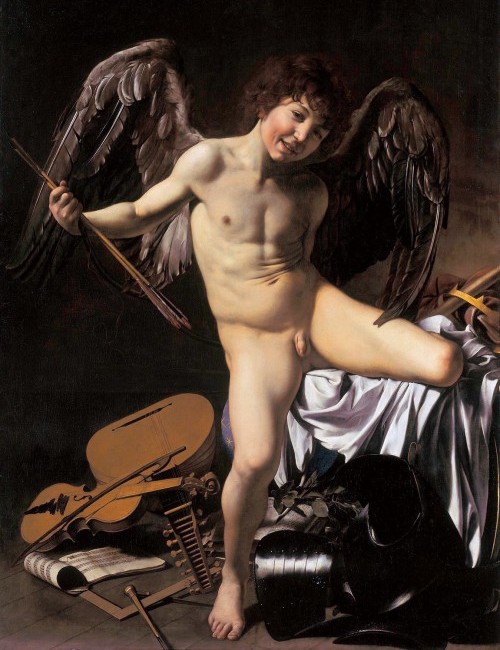
Amor Omnia Vincit, Staatliche Museen, Berlin
“David!” I shouted. “Come here!”
Alarmed by my urgency, he rushed over.
“Oh my God!” he cried. “It’s me!”
It was him. It might have been painted from life. The physical age was right — eleven or twelve. The body was right, and the hair. And the face was spot-on.
“It’s by Caravaggio,” I said. “Called the Victorious Cupid. Or better still, Amor Omnia Vincit — Love Conquers All. I’d have said it was you in an earlier incarnation, if I believed in that sort of thing. But I don’t. But even so, he’s got that cheeky smile of yours that bowled me over. That urchin smile.”
He swatted me. “Actually, I’d call it a dirty smile.” He gave me a specimen.
“Even more like you, then.”
I zoomed in and roamed around the picture inspecting details at high res.
“Look at this!” I had magnified the foot. “His toenails. Broken and filthy. A street urchin’s toes. I reckon Caravaggio found him in the gutter and took pity on him.”
“Like someone else I know who rescued an urchin from the gutter. Metaphorically speaking. And took pity on him.”
David very rarely said things like that, to my relief.
“Zoom in on his cock,” he ordered.
I did so, as large as the pixels allowed.
David peered closely. “Hah! No pubes at all! Not even tiddly little ones like mine.”
“This isn’t the David of today,” I said. “It’s the David of September. The one I first met. No, not even that. It’s the David of five years ago, when he was still smiling.”
He smiled once more. “Zoom out again.”
He brought his chair over. I put my arm round him and nuzzled his Cupid-like chestnut hair. Together we sat contemplating the urchin.
“What’s the little bugger doing with his left hand?” he demanded. “Feeling his arse?”
“Isn’t he pointing to it? An invitation to enter? He reeks of sexiness, like you. He’s seductive, like you. He’s dirty-minded, like you.”
For a full two minutes David sat lost in thought. Then the seductive Cupid smile came back. “But am I really as chubby as that? He’s got quite a tum. And thighs.”
I poked him amidships and pinched his thigh. “Yes, you are. And so have you. You ought to take more exercise. Proper exercise, like squash. Why not try? Gently at first. I’ve got my racket here, and we can borrow one for you at the sports centre.”
He ignored that, and for another long time he stared at the screen in silence.
“It isn’t just a type,” he announced. “Not just a personification of Cupid the god. It’s a portrait. Of a real model. A real boy. Was Caravaggio gay?”
“Dunno. But we’ll find out. We’ve got to, after this. Look, if I carry on with the paintings to see if there are more of this boy, why don’t you chase up the background? More about Caravaggio. Anything about his models.”
The upshot of our researches, when pooled and much summarised, was this. Michelangelo Merisi da Caravaggio was born in (probably) 1573. His career was turbulent. A prickly temper involved him in many a brawl and he was often before the courts or in prison. In 1610 he died of fever, impoverished, wounded and syphilitic, on a beach in Tuscany, at the age of thirty six. But he painted as nobody had ever painted before. In his short life he presided, it has been said, over the birth of modern painting. While at one stage he had a mistress, he was predominantly and obviously gay. Some prudish critics deny it, but his sexuality leaps out from his art. And at least two of his boy models have been identified. In the 1590s it was mainly a Sicilian, Mario Minniti, who first sat for him at the age of sixteen. From 1601 it was a younger boy, who must have been born about 1590 and who grows up before your eyes as the years go by.
He features in perhaps a dozen pictures. To avoid complicating the issue, I am including only a few here. Their dates, though not all firmly fixed, are roughly known.
In 1602, when he was about twelve, the Cupid, which is now in Berlin.
In the same year, the Sacrifice of Isaac in the Uffizi in Florence. When David saw it he winced.
“Oh God! That takes me back to my ordeal. All right, it wasn’t that sort of ordeal. But he’s caught the anguish.”
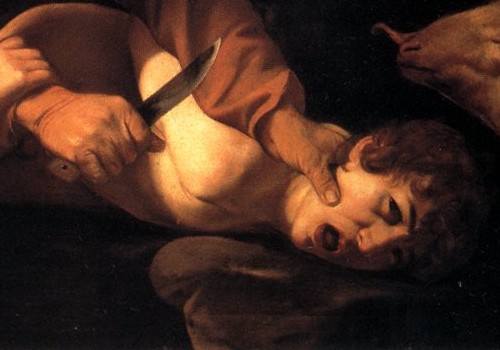
Sacrifice of Isaac , Galleria degli Uffizi, Florence, detail
Supposedly about 1608, John the Baptist at the Fountain, though personally I would put it a bit earlier when he was fifteen or sixteen.
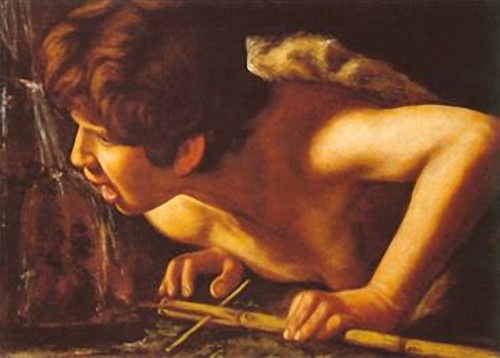
John the Baptist at the Fountain, private collection, detail
“And David! Look! This is you when older. The Vienna David with Goliath’s Head, of 1607. You’re seventeen or so. And the Borghese David of 1610 where you’re about twenty.”
“Blimey! Am I going to look like that?”
“I won’t complain if you do.”
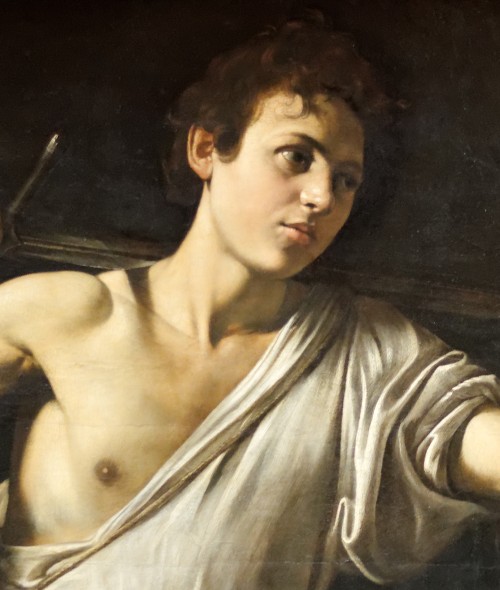
David with Goliath’s Head, Kunsthistorisches Museum, Vienna, detail
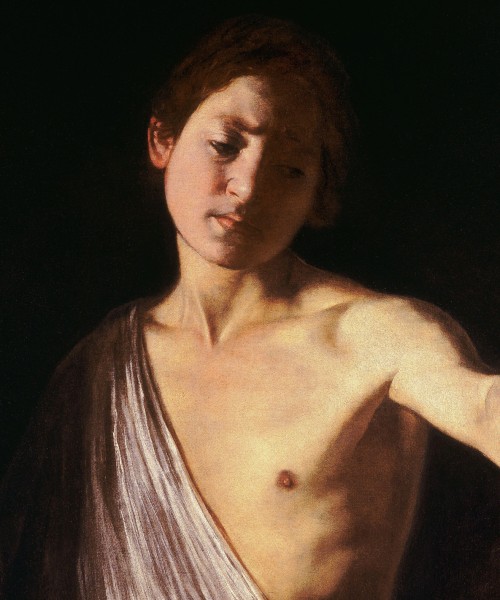
David with the head of Goliath, Galleria Borghese, Rome, detail
For his part, David’s researches pinned down this boy’s identity. When in 1603 Caravaggio was sued for libel by a rival, it was alleged that he had a bardassa named Giovan Battista.
“What the heck’s a bardassa?” I asked. “Not quite a bad-arser, but it still sounds rude.”
“It is. Very rude.” David consulted his notes. “Florio’s Italian-English dictionary of 1598 defines it as ‘a buggering boy’.”
“Ho!”
“Ho indeed! Well, Caravaggio denied that Giovan was his bardassa. But he didn’t deny that he had a bardassa. Then an English tourist who saw the Cupid recorded what he’d been told — ‘’Twas ye body & face of his owne boy or someone who laid with him’.”
“Who laid with him! In other words, the boy he buggered! Has he got a name?”
“Yes. Francesco detto Cecco Caravaggio, which means ‘Francesco, called Caravaggio’s Cecco.’ Cecco’s an endearment for Francesco. And a census of 1604 lists a boy called Francesco living with Caravaggio in lodgings in Rome. He was probably his studio assistant, stretching his canvases, grinding his colours, mixing his paints and stuff …”
“And stuff! I’ll bet there was stuff! I’ll bet a thousand ducats there was stuff!”
“And an early catalogue says that the model for the Borghese David was ‘il suo Caravaggino’ — his own little Caravaggio. I’ll bet a thousand ducats it was Cecco again.”
“I won’t take you on. But has he got a real name?”
“Oh yes. Francesco Boneri. He made a bit of a hit as a painter too. The best part of a generation later, but in the same style — chiaroscuro, light and shade. The scholars suggest he’d learnt the technique from Caravaggio. Here’s his Cupid at the Fountain.
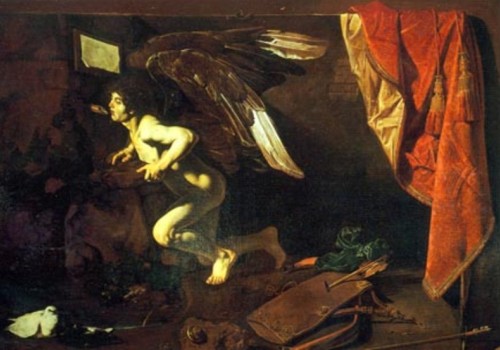
Francesco Boneri, Cupid at the Fountain, private collection
“The chiaroscuro is pure Caravaggio. It looks to me like a self-portrait. It’s dated about 1620, when he’d be thirty. That fits, doesn’t it? He’s older and flabbier …”
This was an opportunity not to be missed.
“Because he still hadn’t been playing squash!”
David swatted me again.
“And look,” he went on, “at the personal touches from his past! Flashbacks to his earlier career! The same wings as our Cupid. The same pose as the Baptist at the Fountain, but more ungainly.”
“And look at the innuendo!” I pointed out. “The spout — a blow-job. His arse — stuck out behind, waiting to be buggered.”
“Don’t you think it’s a thank-you to his late-lamented master? It ought really to have a subtitle. In loving memory of Michelangelo Merisi da Caravaggio, by his bardassa.”
Virtually none of this, needless to say, found its way into our essays for the Prude. But, by the time we finished, it was well into the small hours. Luckily it was now Sunday and we did not have to be up early. Yet this extraordinary night had still not shot its bolt.
“Peter,” said David as we undressed, “I’ve been thinking. Cecco was buggered by Caravaggio. Cupid wants to be buggered. And I want to be buggered too. By you. Now.”
All my qualms returned. “But David, my love …”
“It’s high time, Peter. The record’s been set straight, thanks to you. Carl’s ghost has been laid. All that belongs to the past. Anyway, this won’t be hateful and violent. It’ll be loving and tender. Just like it was when you had your finger up my arse. But that was only a compromise. Only a half-way house. I still hadn’t given you all of me, not then. But now I want to give you everything. Peter, dear Peter …”
He put his hands flat against my naked chest and looked up at my face.
“Thine is the Kingdom!”
That brought tears to my eyes and a lump to my throat. No way could I protest any more.
“And the power and the glory?” I managed.
“Not the power. It corrupts. But the glory, yes. Shared between us.”
“You want to share everything, then? To bugger me too?”
“Yes. Please.”
“Good.”
In view of the difference in our size, one half of this process took time and a great deal of care but was finally achieved without pain. Over the other half there was no difficulty whatsoever. But in both cases it was loving. It was tender. It was glorious. It still is, to this day. And may it remain so for ever and ever. Amen.
Next morning, from the web, I ordered large copies of the six paintings included here, and when they arrived we stuck them up on our wall. If the cleaners were shocked or titillated, nothing was said.
“Let’s keep these under our hats,” said David. “As a surprise. For Dad. And for George and Sophie.”
“Yes, let’s.”
We stood back to take them in.
“You know,” I mused, “they make a good sequence. A symbolic one. First young David unspoiled. Then David being sacrificed. Then David drinking from the fountain of hope. Then David triumphant, twice over. And finally David, many years on, showing his gratitude … Would you mind if I called you Cecco?”
“That wouldn’t really be wise, would it? Not in public. People would ask why, and you’d have to explain all about Cupid, and that I was Caravaggio’s buggering boy. In private, though, you can call me what you like.”
So in private, quite often, I do call him Cecco. Unlike Davy, it is an endearment that seems to fit. But never, thank goodness, has he tried calling me Caravaggio.
Four of the Caravaggio paintings are in the Wikimedia Commons and there designated as in the public domain. The wording in each case runs: This work is in the public domain in the United States and those countries with a copyright term of life of the author plus 100 years or less. This photographic reproduction is therefore also considered to be in the public domain.
- Amor Vincet Omnia
- The Sacrifice of Isaac
- David with the Head of Goliath (Vienna)
- David with the Head of Goliath (Borghese)
The Boneri painting, and John the Baptist at the Well, though not in Wikimedia, fall into exactly the same category.